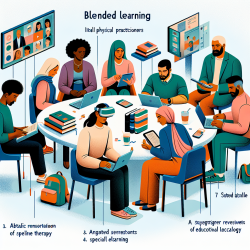As a practitioner in the educational setting, it's essential to continually improve your skills and understanding of the families you work with, especially those facing unique challenges. One such challenge is supporting families of children with Autism Spectrum Disorder (ASD). A recent narrative study titled Growing in Adversity: A Narrative Study of Resilience Generation in Chinese Families of Children with ASD offers valuable insights into how resilience is generated in these families. Let's explore how you can implement these findings to enhance your practice.
Key Findings from the Study
The study identified four main factors influencing resilience generation in Chinese families of children with ASD:
- Cultivating Positive Family Beliefs: Maintaining hope for the child's recovery and positively interpreting adversity can significantly impact a family's ability to cope.
- Adjustment of the Family’s Organizational Pattern: Redistributing family roles and responsibilities helps manage the increased demands of caring for a child with ASD.
- Extending External Resources Positively: Seeking support from external resources such as healthcare providers, special education teachers, and parent support organizations is crucial.
- Optimizing Family Communication: Effective communication within the family, especially between parents and children, enhances resilience and coping mechanisms.
Practical Applications for Practitioners
Here are some practical ways you can apply these findings to support families more effectively:
1. Encourage Positive Family Beliefs
Help families maintain hope and find positive interpretations of their challenges. This could involve facilitating support groups where families can share their experiences and learn from each other.
2. Assist in Adjusting Family Roles
Work with families to identify how they can redistribute responsibilities to better manage the care of their child with ASD. This might involve counseling sessions to help families discuss and agree on new roles.
3. Connect Families with External Resources
Provide information about local support organizations, special education resources, and healthcare providers. Encourage families to build a network of support that extends beyond the immediate family.
4. Promote Effective Communication
Offer workshops or counseling sessions focused on improving communication skills within the family. Emphasize the importance of mutual respect, active involvement, and empathy in parent-child interactions.
Encouraging Further Research
While this study provides valuable insights, it's important to recognize the cultural context in which it was conducted. Encourage practitioners to conduct or participate in further research to understand how these findings can be adapted to different cultural settings. This ongoing research can help refine and improve support strategies for families of children with ASD worldwide.
To read the original research paper, please follow this link: Growing in Adversity: A Narrative Study of Resilience Generation in Chinese Families of Children with ASD.










